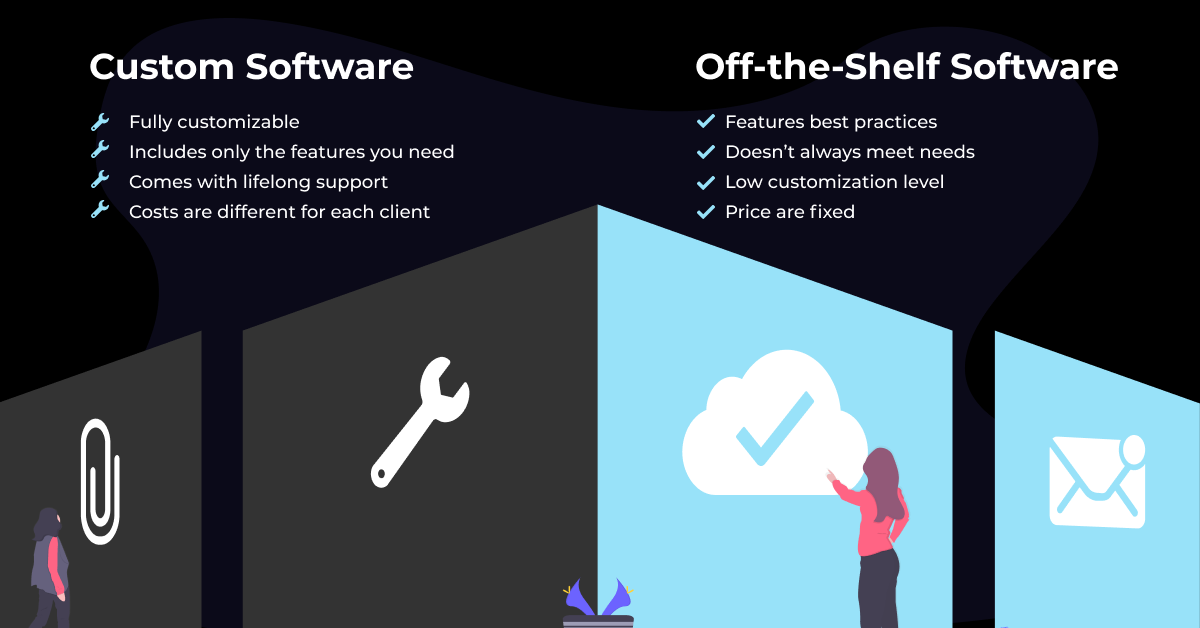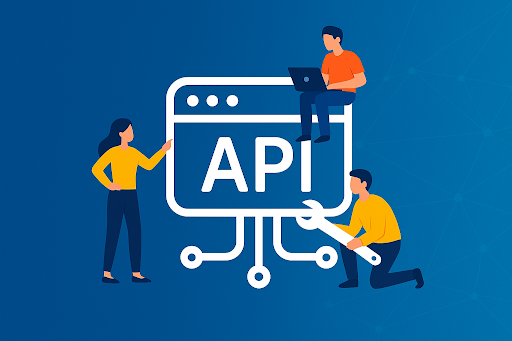Digital transformation has helped many companies deal with the challenge of consumer led demand for more efficient and automated process tools in products and services. These types of improvements help us in our daily lives by handling essential tasks, notifying and reminding us of important events, and enabling remote mobile engagement.
What is Off the Shelf Software?
Off the shelf software refers to packages that are ready to be used immediately. They are generally offered for functionality that is used by many businesses. There are different elements to off the shelf software. For example, every business needs to manage its financial information, so many general off-the-shelf accounting packages are available. Furthermore, many off the shelf packages offer functionality that targets specific industries such as training, eCommerce or design.
What is Custom Software?
Custom software refers to applications that have been specifically designed and built for a specific purpose. Many small and medium enterprises (SMEs) have unique selling propositions and seek to engage with their customers in the best way to make transactions as easy as possible. Equally so many businesses have processes that are unique to their particular offering. Management in those scenarios is likely to attempt to continuously improve those processes to keep costs under control
When deciding whether to purchase off the shelf or engage a custom software development company or allocate internal resources to deliver custom software development a key consideration should always be a cost-benefit analysis. SMEs should ask themselves the hard questions: Will the project either increase revenue, lower costs or both? Will the intervention of a custom software build will lead to more satisfied customers and increased sales? Will the changes drive efficiencies and reduce expenses? Do the available off the shelf software features satisfy the business need? Is it the optimum use of company time to allocate internal resources to the project instead of using an existing available package? If the answers from the evaluation are positive it is worthwhile proceeding.

What are the pros and cons?
There are many advantages to off the shelf software. It will have been developed for a specific purpose for mass consumption so it is likely to achieve it well. It is also probably in current use so there is less likely to be bugs and issues normally associated with a new product. The provider will keep it up to date for all users as in the case of accounting packages when accounting rules or tax rates change. Costs will be lower as they will effectively be shared by many unrelated entities allowing the provider to charge less per user. Free trials are usually available allowing customers to easily evaluate the contribution the software can make for them. The disadvantage of off the shelf software is that it is relatively inflexible. There is likely to be very little opportunity to adjust it to cater to unique items to a particular business. This may mean the company will lose out on possible opportunities in terms of sales or cost savings
The advantage of different types of custom software development is that it allows the company to provide its product or service exactly the way it wants to through customized software products. The customer experience can be tailored exactly to the company’s vision and objectives. Internally custom software can drive process efficiencies leading to a better experience for both staff and customers which will make the company stronger. The disadvantages of custom software development are cost and time to market. It will be more expensive in terms of technical development whether it is incurred by an internal team or outsourced to a custom software development company. Either way, internal resources will be consumed in managing the process of building customized software products.
Any discussion about costs is relative. In the long run, what matters is having the right set of tools to support the complexity and potential of your business. Off-the-shelf software can be a quick solution to an immediate problem. As a business expands and on-boards more complex processes it may mean additional features are required to deliver a better service requiring consideration of a custom software solution. If you decide that there are no off the shelf software packages available to support your business needs you could be in groundbreaking territory. In some cases, companies have been so successful at custom software development for their purposes that they have pivoted from their original business model and ended up marketing the customized software products they have built as well as their regular products.
Time can be a constraint when building a customized software product. Commitment to the process is required. The following gives an example of the steps that are involved:
- Research a good custom software development company
- Gathering project requirements
- Sketch the first wireframes up to the final design
- Development
- Testing to make sure the project passes quality standard
- Deployment
This is the type of investment in the process your company needs to make to develop any type of custom built software. If you want something that surpasses available off the shelf software features you need to be prepared to approach it methodically to reap the benefits later.
Conclusion
At Deventure we have a handful of tools that we use when working on our clients' custom software projects. We want to provide the best results when we commit to working with a new client. Therefore, our toolkit means combining easy and quick to use and mandatory solutions to get the job done. We can talk about these off-the-shelf software products next time and maybe you get inspired by our toolkit.





